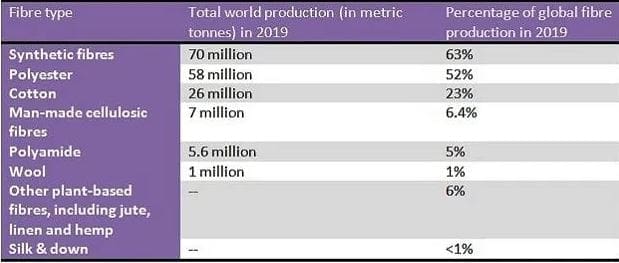In 2019, global fibre production was around 111 million metric tonnes (MT). Fibre production has more than doubled in the last 20 years and is expected to increase by another 30 per cent to 146 million MT in 2030 if business as usual continues, according to the New 2020 Preferred Fibre & Materials Report by global non-profit Textile Exchange.
With a market share of 25 per cent in 2019 (2018-19 ICAC harvest year), the market for preferred cotton is more advanced than for most other materials. While the share of recycled polyester is rising and reached 14 per cent in 2019, it is not yet advancing at the speed and scale required.
Low prices of fossil-based polyester create a challenging market environment for recycled and bio-based polyester, said the report. As the fibre with the largest market share, the impact scale of polyester is enormous.
While using plastic bottles as feedstock is a good start—and most recycled polyester is currently based on plastic bottles—we need to move towards textile-to-textile recycling and urgently improve social conditions in waste collection and recycling.
The market share of preferred polyamide is still low compared to polyester, due to technical challenges and less attention due to lower volumes.
The market share of recycled man-made cellulose fibres (MMCFs) is estimated at below 1 per cent, but as a lot of research and development is under way, so it is expected to increase significantly in the next few years.
Despite a high market share of MMCfs certified by Germany-based Forest Stewardship Council (FSC) and Geneva-based Programme for the Endorsement of Forest Certification (PEFC)—estimated at around 40-50 per cent—the risk of sourcing MMCFs from ancient or endangered forests remains high, said the report.
Conventional wool dominates the wool market but the adoption of non-mulesing and preferred wool programmes, such as the Responsible Wool Standard, is increasing. The market share of recycled wool is still low, but the impact potential is high, the report said.

